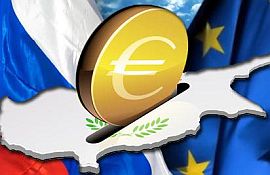Baltic States – CIS, Banks, EU – Baltic States, Financial Services, Latvia, Legislation, Russia
International Internet Magazine. Baltic States news & analytics
Friday, 06.02.2026, 21:20
Financial Times: Latvian hopes awash with Russian money from Cyprus
 Print version
Print version |
|---|
According to the newspaper, Latvian authorities are desperate to downplay the prospects of an influx of money from Cyprus, especially as they are seeking to become the 18th member of the euro – against the reservations of some already in the single currency.
“Currently we do not see any rush of Cypriot money into Latvia. This country is being watched and we are not going to be competing for this money,” Prime Minister Valdis Dombrovskis told The Financial Times.
But in some ways a flood of money from Cyprus has already entered Latvia’s banks. Latvia does not resemble Cyprus by having a large financial sector or a big government debt burden, having taken care of its public finances following a EUR 7.5 billion international bailout in 2008. Where it does look somewhat Cypriot is in its thirst for Russian bank deposits.
Non-resident deposits, those from non-Latvians, represented 49% of the 12.7 billion lats (EUR 18 billion) total at the end of February, one of the highest in the EU. About 80-90% of those non-resident deposits come from the former Soviet Union, according to the International Monetary Fund. And they have been growing fast: non-resident deposits increased 17% in 2012.
“The recent acceleration is believed to be mainly due to CIS [ex-Soviet countries] depositors relocating their funds from countries with banks under stress in the euro area, mainly Cyprus,” the IMF said earlier this year.
“Latvia has had a free ride for some time,” says Tom Mayne, an analyst at Global Witness, a London-based anti-corruption group. “Latvia seems to be very happy to accept this money coming from the former Soviet Union, places that pose a high risk of money laundering. That has to be a matter of concern after Cyprus.”
The authorities in Riga counter that they have toughened anti-money laundering rules in recent years, while banking regulators imposed stricter capital and liquidity requirements on those banks with high levels of non-resident deposits.
The matter is a delicate one, not just after Cyprus’ bailout, but also because Latvia is applying to join the euro from January. The European Commission and European Central Bank are due to give their opinion on Latvia’s suitability in June, but there is unease among some euro members.
On the strict entry criteria such as low inflation and public debt, Latvia passes with flying colors after undertaking one of the biggest austerity programs of any country following the 2008 financial crisis. But some existing euro members are worried about “sustainability”, a catch-all phrase for worries about inflation after a possible euro entry as well as the banking system.
“We want to be sure that we are not creating another trouble zone in Europe. But I do not think that will be the case,” says one EU ambassador in Riga. The ECB has contacted the Latvian central bank over non-resident deposits “and the Latvian side has given its assurances”, officials in Riga say. The European Commission had warned in January of the risks in a large non-resident banking sector.
France is seen by many as potentially the biggest objector, not least because of Latvia’s status as a hardcore supporter of austerity. Dombrovskis is heading to Paris this month to meet the French president and prime minister in an attempt to shore up support for euro entry.








 «The Baltic Course» Is Sold and Stays in Business!
«The Baltic Course» Is Sold and Stays in Business!

